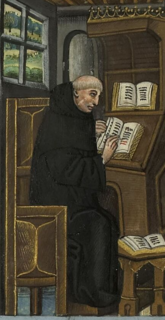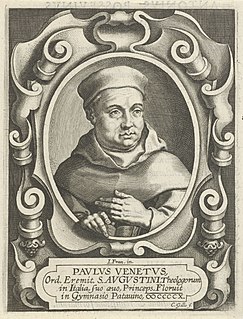Related Research Articles

William of Ockham, OFM was an English Franciscan friar, scholastic philosopher, apologist, and Catholic theologian, who is believed to have been born in Ockham, a small village in Surrey. He is considered to be one of the major figures of medieval thought and was at the centre of the major intellectual and political controversies of the 14th century. He is commonly known for Occam's razor, the methodological principle that bears his name, and also produced significant works on logic, physics and theology. William is remembered in the Church of England with a commemoration on 10 April.

Thomas Bradwardine was an English cleric, scholar, mathematician, physicist, courtier and, very briefly, Archbishop of Canterbury. As a celebrated scholastic philosopher and doctor of theology, he is often called Doctor Profundus.
Jean Buridan was an influential 14th-century French philosopher.

Giles of Rome O.S.A., was a Medieval philosopher and Scholastic theologian and a friar of the Order of St Augustine, who was also appointed to the positions of Prior General of his Order and as Archbishop of Bourges. He is famed as being a logician, producing a commentary on the Organon by Aristotle, and for his authorship of two important works, De Ecclesiastica Potestate, a major text of early 14th century Papalism, and De regimine principum, a guide book for Christian temporal leadership. Giles was styled Doctor Fundatissimus by Pope Benedict XIV.
Albert of Saxony was a German philosopher and mathematician known for his contributions to logic and physics. He was bishop of Halberstadt from 1366 until his death.
John Baconthorpe was a learned English Carmelite friar and scholastic philosopher.

The Physics is a named text, written in ancient Greek, collated from a collection of surviving manuscripts known as the Corpus Aristotelicum, attributed to the 4th-century BC philosopher Aristotle.

Paul of Venice was a Catholic philosopher, theologian, logician and metaphysician of the Order of Saint Augustine.
Francis of Mayrone was a French scholastic philosopher. He was a distinguished pupil of Duns Scotus, whose teaching (Scotism) he usually followed.
Summa and its diminutive summula was a medieval didactics literary genre written in Latin, born during the 12th century, and popularized in 13th century Europe. In its simplest sense, they might be considered texts that 'sum up' knowledge in a field, such as the compendiums of theology, philosophy and canon law. Their function during the Middle Ages was largely as manuals or handbooks of necessary knowledge used by individuals who would not advance their studies any further.

Walter Burley was an English scholastic philosopher and logician with at least 50 works attributed to him. He studied under Thomas Wilton and received his Master of Arts degree in 1301, and was a fellow of Merton College, Oxford until about 1310. He then spent sixteen years in Paris, becoming a fellow of the Sorbonne by 1324, before spending 17 years as a clerical courtier in England and Avignon. Burley disagreed with William of Ockham on a number of points concerning logic and natural philosophy. He was known as the Doctor Planus and Perspicuus.
John of Jandun or John of Jaudun was a French philosopher, theologian, and political writer. Jandun is best known for his outspoken defense of Aristotelianism and his influence in the early Latin Averroist movement.
Durandus of Saint-Pourçain was a French Dominican, philosopher, theologian, and bishop.
John of Paris, also called Jean Quidort and Johannes de Soardis, was a French philosopher, theologian, and Dominican friar.
Francesco Silvestri, O.P. was an Italian Dominican theologian. He wrote a notable commentary on Thomas of Aquinas's Summa contra gentiles, and served as Master General of his order from 1525 until his death.
John (Johannes) Hennon was a Dutch medieval philosopher in the late Scholastic tradition. He was from Nijmegen, and studied at the University of Paris, where he received his magister artium and baccalaureus formatus in sacra pagina (1463).

John Duns Scotus, commonly called Duns Scotus, was a Scottish Catholic priest and Franciscan friar, university professor, philosopher, and theologian. He is one of the four most important Christian philosopher-theologians of Western Europe in the High Middle Ages, together with Thomas Aquinas, Bonaventure, and William of Ockham.
Richard of Lavenham was an English Carmelite, known as a scholastic philosopher. He is now remembered for his approach to the problem of future contingents.
Robert of Bridlington was an English clergyman and theologian who was the fourth prior of Bridlington Priory. He held the office during the period from 1147 to 1156, but it is not clear if he died in office or resigned before his death. Besides holding monastic office, he wrote a number of commentaries on biblical books as well as other treatises. Not all of his works have survived to the current day.
Abū al-Faraj ʿAbd Allāh ibn al-Ṭayyib, known by the nisbaal-ʿIrāqī and in medieval Latin as Abulpharagius Abdalla Benattibus, was a prolific writer, priest and polymath of the Church of the East. He practised medicine in Baghdad and wrote in Arabic about medicine, canon law, theology and philosophy. His biblical exegesis remains the most influential written in Arabic and he was an important commentator on Galen and Aristotle. He also produced translations from Syriac into Arabic.